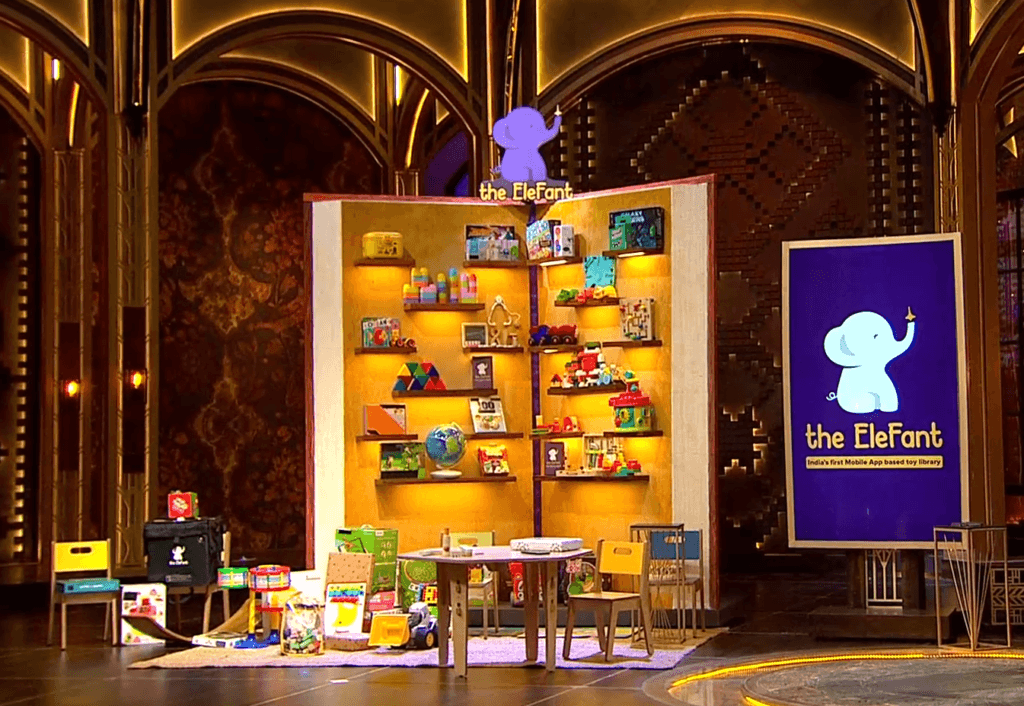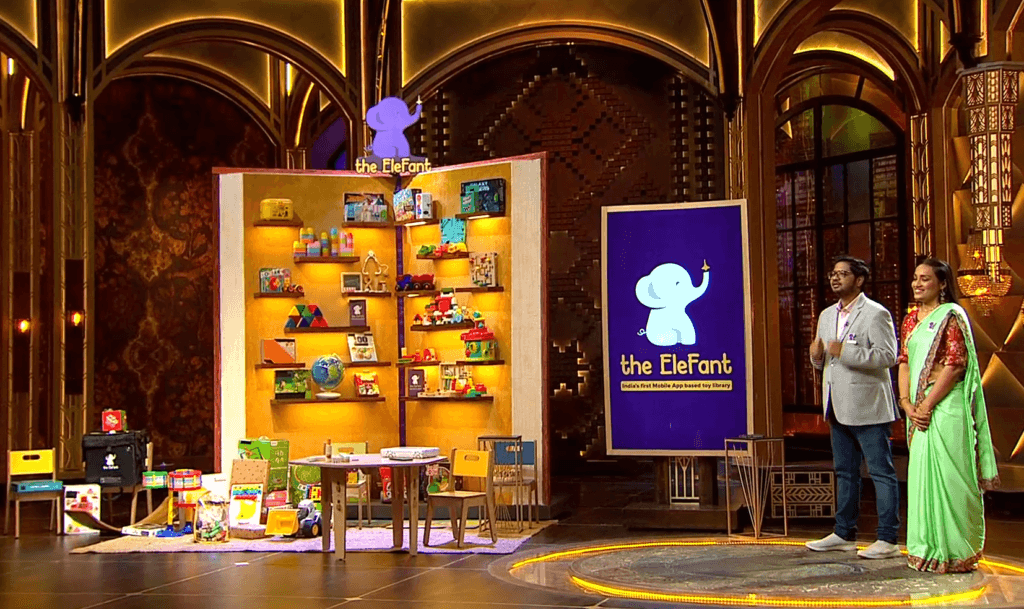The Elefant Shark Tank India Episode Review
Website Information
- Website:- The Elefant
- Build on JavaScript frameworks- React, Next.js 15.1.4
- Poor SEO Performance, SEO improvement is needed.
- ORGANIC TRAFFIC: 0 visitors per month.
Founders
- The Elefant was co-founded by Sourabh Jain and Srishti Padia Jain, a husband-and-wife team from Mumbai.
- They developed the idea for their toy library business after observing the growing number of toys their three-year-old child accumulated.
- Recognizing that the concept of a toy library was unfamiliar outside Mumbai, Sourabh left his full-time job to invest ₹1.25 crore of his own money into the venture before seeking additional capital from venture capitalists.

Brand Overview
- The Elefant is an innovative app-based toy and book library designed for children.
- The service allows parents to select subscription plans and choose toys and books for their kids.
- The business operates on a franchise model, where franchisees manage libraries in their homes, storing, sanitizing, and packing toys for delivery.
- The Elefant aims to simplify parenting by providing a wide range of high-quality toys and books while promoting sustainable play.
Shark Tank India Appearance and Ask
- Sourabh and Srishti Jain appeared on Shark Tank India Season 4, Episode 29, where they sought an investment of ₹60 lakh in exchange for 1% equity in their business, valuing it at ₹60 crore.
Season and Episode Air Date
- Season: 04
- Episode: 29
- Episode Air Date: Thursday, 13 February 2025
Product Overview
- The Elefant offers a subscription-based service for toys and books, allowing parents to order items through a mobile app.
- The franchise model enables local franchisees to operate libraries from their homes, ensuring convenience and accessibility for customers.
Investor Reactions
- The Sharks expressed skepticism regarding the business model. Vineeta Singh was the first to withdraw, citing challenges in scaling subscription-based businesses.
- Peyush Bansal raised concerns about the sustainability of circulating the same toys for extended periods and highlighted hidden costs associated with franchise operations.
- Aman Gupta disagreed with the subscription model, while Kunal Bahl suggested they reevaluate their approach due to revenue concerns.
- Anupam Mittal noted that despite appealing concepts like sustainability and women entrepreneurship, the business had underlying issues that needed addressing.
Customer Engagement Philosophy
- The Elefant focuses on making parenting easier by providing a modern toy and book library experience.
- Their philosophy centers on delivering high-quality products curated by experts while simplifying the process of accessing toys through a user-friendly app.
- The goal is to enhance playtime for children while ensuring convenience for parents.
Product Highlights
- App-Based Library: Provides an easy-to-use platform for selecting toys and books.
- Subscription Model: Offers flexible plans catering to different needs.
- Franchise Operation: Libraries managed by local franchisees ensure personalized service.
- Quality Assurance: Products are curated by experts to ensure safety and quality.
Future Vision
- The Elefant aims to expand its reach across India by increasing brand awareness and enhancing its service offerings.
- The founders envision becoming a leader in the toy library segment by continuing to innovate and adapt their business model based on customer feedback and market trends.
- They also plan to explore partnerships with educational institutions and community organizations to promote sustainable play practices among families.
Deal Finalized or Not
- The Elefant did not secure any offers from the Sharks during their pitch.

| Category | Details |
|---|---|
| Website Information | |
| Website | The Elefant |
| Built On | JavaScript frameworks – React, Next.js 15.1.4 |
| SEO Performance | Poor (Needs improvement) |
| Organic Traffic | 0 visitors per month |
| Founders | |
| Founders | Sourabh Jain and Srishti Padia Jain |
| Background | Developed the idea based on their child’s toy accumulation |
| Investment | ₹1.25 crore personal investment before seeking VC funding |
| Brand Overview | |
| Concept | App-based toy and book library for children |
| Subscription Plans | Allows parents to choose toys and books |
| Franchise Model | Franchisees manage libraries from home, sanitize, and pack toys for delivery |
| Sustainability | Promotes sustainable play and reduces toy wastage |
| Shark Tank India Appearance | |
| Season | 04 |
| Episode | 29 |
| Air Date | Thursday, 13 February 2025 |
| Investment Ask | ₹60 lakh for 1% equity (₹60 crore valuation) |
| Product Overview | |
| Service Model | Subscription-based toy and book rental service |
| Franchise Operation | Local franchisees run toy libraries from their homes |
| Investor Reactions | |
| Vineeta Singh | Withdrew due to scaling challenges in subscription businesses |
| Peyush Bansal | Concerned about toy circulation sustainability and franchise costs |
| Aman Gupta | Disagreed with the subscription model |
| Kunal Bahl | Suggested revising the business model due to revenue concerns |
| Anupam Mittal | Noted issues despite strong sustainability and women entrepreneurship angles |
| Customer Engagement Philosophy | |
| Goal | Simplify parenting through a curated toy and book library |
| App Experience | User-friendly and expert-curated toy selection |
| Product Highlights | |
| App-Based Library | Easy selection and ordering via mobile app |
| Subscription Model | Flexible plans for different needs |
| Franchise Operation | Local franchisees ensure personalized service |
| Quality Assurance | Expert-curated, safe, and high-quality toys |
| Future Vision | |
| Expansion Plan | Increase brand awareness and service offerings across India |
| Market Leadership | Establish The Elefant as the leading toy library brand |
| Partnerships | Collaborate with educational institutions and community organizations |
| Shark Tank Deal Status | |
| Final Outcome | No offers were secured from the Sharks |
| Business Potential in India | |
| Indian Toy Market | $1.5 billion in 2022, projected to reach $3.3 billion by 2027 (CAGR 17.5%) |
| Unique Opportunity | Toy rental model is relatively new in India |
| Total Addressable Market (TAM) | |
| Target Market | ~400 million children aged 0-12 years |
| Market Penetration Potential | 1% engagement = ~4 million families |
| Subscription Growth | Expected to capture market share as parents seek cost-effective alternatives |
| Target Audience | |
| Age Group | Parents of children aged 0-12 years |
| Income Level | Middle to upper-middle-class families |
| Geographic Focus | Urban areas (Mumbai, Delhi, Bangalore, Pune) |
| Marketing Strategy | |
| Content Marketing | Blogs and videos on toy libraries and educational play |
| Social Media | Instagram & Facebook campaigns showcasing user stories |
| Influencer Collaborations | Partnerships with parenting influencers |
| Content & Digital Marketing Strategy | |
| SEO Improvement | Required to improve organic traffic (currently 0 visitors/month) |
| Email Marketing | Newsletters featuring new toys, parenting tips, and offers |
| Distribution Strategy | |
| Franchise Model | Local franchisees manage operations from home |
| E-Commerce Platform | Enhance the app for smooth ordering & delivery |
| Advantages | |
| Sustainability | Encourages toy sharing over ownership |
| Quality Assurance | High-quality and curated toys for safety |
| Challenges | |
| Market Education | Need to familiarize parents with the toy library concept |
| Franchise Costs | High initial investment might deter partners |
| Reasons for Success | |
| Educational Toys | Growing demand for learning-based play |
| Convenience | Subscription model reduces clutter and saves money |
| Mitigation Strategies | |
| Customer Feedback | Continuous adaptation based on user preferences |
| Flexible Pricing | Tiered subscription plans for different budgets |
| Future Business Roadmap | |
| Short-Term (1 Year) | Improve SEO, launch targeted urban marketing campaigns |
| Mid-Term (2-3 Years) | Expand franchises to more Indian cities, partner with schools |
| Long-Term (4-5 Years) | Establish The Elefant as India’s top toy library, explore global expansion |
| Valuation Increase Strategies | |
| Innovation | Continuously enhance product offerings |
| Brand Engagement | Community-driven sustainability & education initiatives |
The Elefant Shark Tank India Business Plan

Business Potential in India
- Market Size: The Indian toy market is projected to grow from $1.5 billion in 2022 to $3.3 billion by 2027, with a CAGR of 17.5%. This growth is driven by increasing disposable incomes and a rising demand for educational toys.
- Toy Library Concept: The toy rental model is relatively new in India, presenting a unique opportunity to tap into a market that values sustainability and cost-effectiveness.
Total Addressable Market (TAM)
- Target Market Size: With approximately 400 million children aged 0-12 years in India, if just 1% of this demographic engages with The Elefant’s services, the potential customer base could be around 4 million families.
- Subscription Growth: As more parents seek alternatives to purchasing toys, the subscription-based model can capture a significant share of the market.
Ideal Target Audience and Demographics
- Age Group: Targeting parents of children aged 0-12 years.
- Income Level: Middle to upper-middle-class families who are willing to spend on quality educational resources but prefer not to buy toys outright.
- Geographic Focus: Urban areas with higher disposable incomes, including cities like Mumbai, Delhi, Bangalore, and Pune.
Marketing Strategy
- Content Marketing: Develop informative blogs and videos about the benefits of toy libraries and educational play, targeting parents through SEO-optimized content.
- Social Media Campaigns: Utilize platforms like Instagram and Facebook to engage with parents, showcasing success stories and user-generated content.
- Influencer Collaborations: Partner with parenting influencers to reach a broader audience and establish credibility.
Content and Digital Marketing Strategy
- SEO Improvement: Currently, The Elefant has an organic traffic count of 0 visitors per month, necessitating a comprehensive SEO strategy to enhance visibility.
- Email Marketing: Create newsletters featuring new toys, parenting tips, and exclusive offers to engage existing customers and attract new ones.
Distribution Strategy
- Franchise Model: Leverage local franchisees to manage toy libraries from their homes, ensuring personalized service and community engagement.
- E-Commerce Platform: Enhance the existing app for seamless ordering and delivery processes.
Advantages
- Sustainability Focus: Promotes sustainable consumption by encouraging sharing rather than ownership of toys.
- Quality Assurance: Offers high-quality, curated toys that are safe for children.
Challenges
- Market Education: The concept of toy libraries is still unfamiliar to many parents; educating the market will be crucial.
- Franchise Costs: Initial investment requirements for franchisees may deter potential partners.
Reasons for Success
- Growing Demand for Educational Toys: Parents increasingly seek educational resources that promote learning through play.
- Convenience Factor: The subscription model provides convenience for busy parents who want access to a variety of toys without the clutter.
Mitigation Strategies
- Customer Feedback Loops: Regularly gather feedback from users to adapt offerings based on preferences.
- Flexible Pricing Models: Introduce tiered subscription plans catering to different budgets to attract a wider audience.
Future Business Roadmap
Short-Term Goals (1 Year):
- Improve SEO performance to increase organic traffic significantly.
- Launch targeted marketing campaigns focusing on urban parents.
Mid-Term Goals (2-3 Years):
- Expand franchise operations into additional cities across India.
- Develop partnerships with schools and educational organizations.
Long-Term Goals (4-5 Years):
- Establish The Elefant as a leading brand in the toy library sector in India.
- Explore international expansion opportunities based on domestic success.
Valuation Increase Strategies:
- Continuously innovate product offerings based on customer feedback.
- Strengthen brand presence through community engagement initiatives focused on sustainability and education.
By focusing on these strategic areas, The Elefant can effectively position itself within the growing Indian toy market while addressing potential challenges head-on.



The Elefant Shark Tank India Episode Review